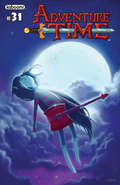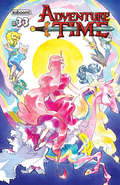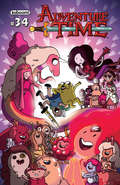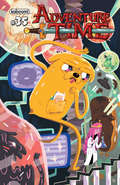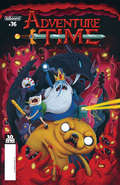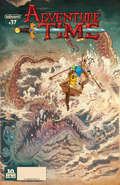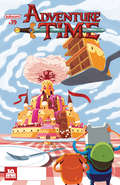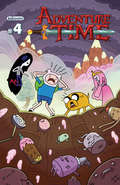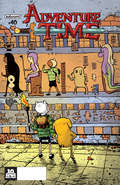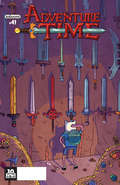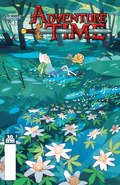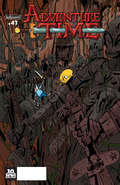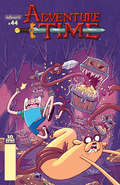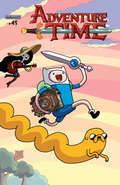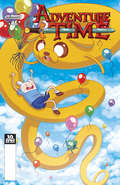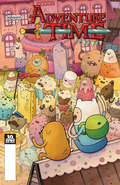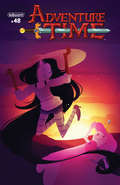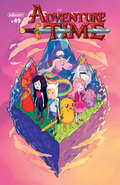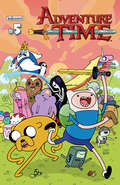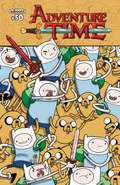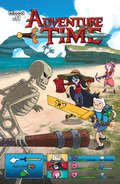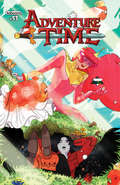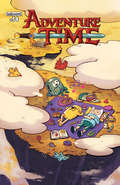- Table View
- List View
Adventure Time (Planet of the Apes #31)
by Pendleton Ward<p>The world of Ooo is a quiet place, where candy and creatures stick to themselves and nothing ever happens?it's almost ACCEPTABLE. It's a twisted adventure starring Ooo's most yellow Earl and there is pretty much nothing Finn and Jake can do about it. <p>This is a fixed-format ebook, which preserves the design and layout of the original print book.</p>
Adventure Time (Planet of the Apes #32)
by Pendleton Ward<p>Finn is on an impossible mission to break Magic Man's curse so that he can finally live his life?and remember it! It's going to take a lot of pal time and a lot of help from the best of friends but this definitely seems like an adventure that Finn and Jake can take-if only Finn could remember. <p>This is a fixed-format ebook, which preserves the design and layout of the original print book.</p>
Adventure Time (Planet of the Apes #33)
by Pendleton Ward<p>Magic Man's hold on Finn is proving to be stronger than anyone had thought and it's taking the whole crew to band together to help their friend, only this time, there really might be nothing they can do. It's up to Finn to stand up to Magic Man, if only he could find the bully. <p>This is a fixed-format ebook, which preserves the design and layout of the original print book.</p>
Adventure Time (Planet of the Apes #34)
by Pendleton Ward<p>Finn has made it to Magic Man at last! It's time for this adventure to end and for Finn to finally get his memory back. It might seem like an easy end, but it looks like there is still one more trick up Magic Man's sleeve. <p>This is a fixed-format ebook, which preserves the design and layout of the original print book.</p>
Adventure Time (Planet of the Apes #35)
by Pendleton Ward<p>It's the end of an era...the last ADVENTURE TIME issue featuring the Eisner Award-winning team of Ryan North, Shelli Paroline, and Braden Lamb. It's your chance to say goodbye, and experience an adventure you'll never forget. <p>This is a fixed-format ebook, which preserves the design and layout of the original print book.</p>
Adventure Time (Planet of the Apes #36)
by Pendleton Ward<p>It's the first Adventure Time starring its new creative team! With indie all-star Chris Hastings writing and the amazingly talented Zachary Sterling on art, these mathematical adventures are only going to get more algebraic! <p>This is a fixed-format ebook, which preserves the design and layout of the original print book.</p>
Adventure Time (Planet of the Apes #37)
by Pendleton Ward<p>Finn and Jake might have finally met their match in the EPIC THUMB WAR COMPETITION FOR BAKED GOODS, but it looks like their battle is just beginning as these two pals get ready for their biggest challenge yet. <p>This is a fixed-format ebook, which preserves the design and layout of the original print book.</p>
Adventure Time (Planet of the Apes #39)
by Pendleton Ward<p>The entire world of Ooo is not able to cook but Jake comes through and saves the day with his sandwiches. It's not over yet, though, as the witch is gonna summon her ultimate monster baddie. <p>This is a fixed-format ebook, which preserves the design and layout of the original print book.</p>
Adventure Time (Planet of the Apes #4)
by Pendleton Ward<p>Oh My Glob! The Latest Super-Cool Issue of the Hit Series! Finn, Jake, Marceline, Princess Bubblegum and even Lumpy Space Princess have banded together to stop that jerk the Lich from throwing all of Ooo into the sun! It's gonna take a lot more than a sweet punch to knock this guy out - luckily, Finn and Jake are on it! The Cartoon Network cartoon's brand-new comic book series is a huge hit! Don't miss this arc-ending issue! <p>This is a fixed-format ebook, which preserves the design and layout of the original print book.</p>
Adventure Time (Planet of the Apes #40)
by Pendleton Ward<p>It's a special interactive, one-shot issue! Magic Man plans to use the reader to help beat Finn and Jake, but can our heroes turn the tables? <p>This is a fixed-format ebook, which preserves the design and layout of the original print book.</p>
Adventure Time (Planet of the Apes #41)
by Pendleton Ward<p>New story arc! Peppermint Butler is one of the most mysterious dudes in Ooo. When he approaches Finn and Jake to recruit them for the secret agency he runs, they've just gotta join and see what's going on! <p>This is a fixed-format ebook, which preserves the design and layout of the original print book.</p>
Adventure Time (Planet of the Apes #42)
by Pendleton Ward<p>Finn and Jake are on the run, trying to figure out who on the inside framed them for the destruction of Peppermint Butler's secret security team. <p>This is a fixed-format ebook, which preserves the design and layout of the original print book.</p>
Adventure Time (Planet of the Apes #43)
by Pendleton Ward<p>Finn and Jake break into Party God's yacht to try and clear their names! <p>This is a fixed-format ebook, which preserves the design and layout of the original print book.</p>
Adventure Time (Planet of the Apes #44)
by Pendleton Ward<p>Finn and Jake are pretty sure the King of Ooo's big conference is a trap and have to sneak in to stop it! <p>This is a fixed-format ebook, which preserves the design and layout of the original print book.</p>
Adventure Time (Planet of the Apes #45)
by Pendleton Ward<p>Special one-shot issue! Princess Bubblegum needs Lemongrab's help, but that means she needs to do things his way for once. <p>This is a fixed-format ebook, which preserves the design and layout of the original print book.</p>
Adventure Time (Planet of the Apes #46)
by Pendleton Ward<p>When one of Joshua's old spells wears off, Finn and Jake find themselves facing an old childhood friend that neither of them can remember! <p>This is a fixed-format ebook, which preserves the design and layout of the original print book.</p>
Adventure Time (Planet of the Apes #47)
by Pendleton Ward<p>Finn, Jake, and their mysterious "old friend" travel to Jake's parents' old apartment in the city to figure out what's going on! <p>This is a fixed-format ebook, which preserves the design and layout of the original print book.</p>
Adventure Time (Planet of the Apes #48)
by Pendleton Ward<p>Finn and Jake learn the truth about their mysterious old friend and his connection to Joshua's spell. <p>This is a fixed-format ebook, which preserves the design and layout of the original print book.</p>
Adventure Time (Planet of the Apes #49)
by Pendleton Ward<p>Finn and Jake must re-banish their old friend from reality in order to defeat a monstrous threat. <p>This is a fixed-format ebook, which preserves the design and layout of the original print book.</p>
Adventure Time (Planet of the Apes #5)
by Pendleton Ward<p>Don't miss the beginning of the new arc of this totally rhombus series! The totally sick gang of Finn, Jake, Marceline, Princess Bubblegum, and the Ice King are back in this new arc of the incredibly popular all-ages series! You won't want to miss this ultra-awesome issue that kicks off a brand-new storyline! Featuring a back-up story by Paul Pope! <p>This is a fixed-format ebook, which preserves the design and layout of the original print book.</p>
Adventure Time (Planet of the Apes #50)
by Pendleton Ward<p>This special oversized one-shot issue introduces new series artist Ian McGinty (Welcome to Showside, Bravest Warriors)! Finn takes a tour of his past lives when he astral projects through an old photo album. Features special incentive covers by the original Adventure Time art team, Shelli Paroline & Braden Lamb, and Jeffrey Brown (Darth Vader and Son)! <p>This is a fixed-format ebook, which preserves the design and layout of the original print book.</p>
Adventure Time (Planet of the Apes #51)
by Pendleton Ward<p>After too many back-to-back quests, Jake and Finn disagree on how important doing this hero stuff really is. <p>This is a fixed-format ebook, which preserves the design and layout of the original print book.</p>
Adventure Time (Planet of the Apes #52)
by Pendleton Ward<p>In the ghost realm, Jake is met with some pretty familiar challenges to overcome. <p>This is a fixed-format ebook, which preserves the design and layout of the original print book.</p>
Adventure Time (Planet of the Apes #53)
by Pendleton Ward<p>Jake successfully fools King Ghost of the ghost realm and must escape with the cure for Finn, but could this have been a ruse all along to teach Jake a lesson? <p>This is a fixed-format ebook, which preserves the design and layout of the original print book.</p>
Adventure Time (Planet of the Apes #54)
by Pendleton Ward<p>Finn and Jake are sheriff and deputy of a wild west town...or are they? Is this even real?! <p>This is a fixed-format ebook, which preserves the design and layout of the original print book.</p>
